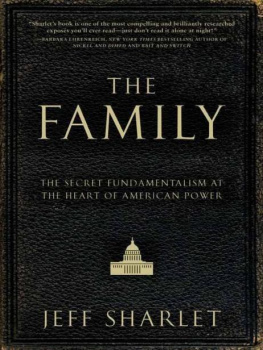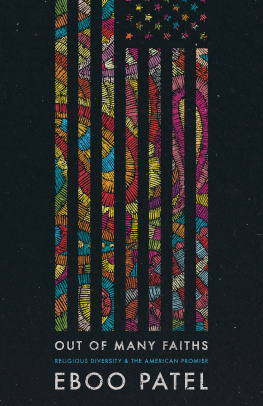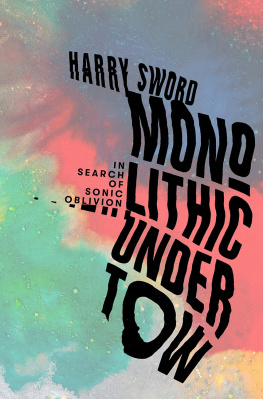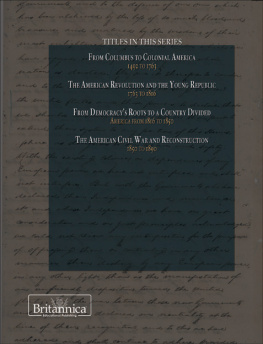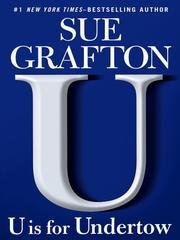The
Undertow
Scenes from a Slow Civil War
Jeff Sharlet
Contents
Prelude :
O ur C ondition
Throat clearing such as this prelude usually accounts for a journey that ends with the book in your hands. But this book is written from the middle of something, a season of coming apart. A friend said that it feels sometimes now as if we are bobbing in the sea, surrounded by sharks, but I misheard. I thought he said sharps. I pictured myself pulled by the undertow into deep water, jagged with needles and knives and razors and broken glasslike that of the window through which Ashli Babbitt, a subject of this books title essay, attempted to climb when she invaded the Capitol on January 6, 2021. Babbitt, shot for her trouble, was a fool who pursued her own death. And yet, many of us might say the same of ourselves. The peril in which the country finds itself now is not natural; it is in the broadest sense of our own American making.
My friend offered another metaphor: When youre in the trough, its hard to see the crest of the next wave. He meant it is hard to see hope, but I could only think that what we see as we rise with the water is that the next wave will be bigger, and the one after that bigger still. And if we make it to shore? Theres the smoke of wildfire, like that which filled so much of the Western sky as I drove across the country near this books end; and the rain such as that which falls in the valley to which I came home, harder now than in recorded history, flooding land that hasnt been underwater for fifteen thousand years; and all the many smaller signs of the climate crisis that is increasingly simply our condition. I think, for instance, of the headline this morning in my local paper: a winter fair that the town next door has long celebrated on the ice of a pond will not take place this year, or next. The ice is no longer viable. The expertsthe U.S. Army Corps of Engineers maintains a laboratory for the study of cold here, and in years past they would bore through the ponds ice to show children the stages of freezingsay it will not be reliably viable again. No more winter fair, no more marching bands on the frozen pond.
Such a small loss! But a real one. This book of stories of difficult people doing terrible things is a register also of grief and its distortions, how loss sometimes curdles into fury and hate, or denial, or delusion. Especially delusion. The first time I found myself at gunpoint was twenty years ago, a sheriff who pulled a fake weapon without identifying it as such. I was as scared as you might expectand scared, too, when, driving across the country near this books end, I kept meeting men with guns who said they might have no choice but to draw them soon. Bluster, or anticipation? Fact or fiction? The pointlessness of such distinctions was the sheriffs point. He grinned when I jumped in fear: See now, he said, that just goes to show how things that arent real can still hurt you. He meant, he said, that had I held a toy like that myself he would have shot me.
The sheriffs stunt was a performance, and so, too, are the subjects of the stories that follow. Power is always of its moment. But coursing through the undertow now are certain recurring lies, chief among them that of Whiteness, into which so much else is drawn: desires, jokes, games, money, schools, anger. My capitalization of Whiteness in this book is no undue honor. Its visibility. White people need to be more visible? Yesto themselves, argues Princeton historian Nell Irvin Painter, author of A History of White People. White Americans have had the choice of being something vague, something unraced and separate from race, she writes in The Washington Post. A capitalized White challenges that freedom, by unmasking Whiteness as an American racial identity as historically important as Blackness.
Many of the stories that follow are about performances of Whiteness, the delusions with which it disguises and reveals itself. There is a difference, though, between delusion and imaginationthats the hope of this book. Ive tried to pull a thread of imagination through these pages, to notice moments of generosity, small solidarities, genuine wit, actual funny, real sorrow and love. Although this book is about a period of dissolution the documentary filmmaker Jeffrey Ruoff has described as the Trumpocene, its anchored against the undertow of these times at its beginning and end by such storiesof real sorrow and lovefrom other days of struggle. They are portraits of singers, their best songs forgotten or worn smooth by time and seemingly safe. Such is the effect of the undertow, which too often pulls our voices beneath. The losses these chapters chart are just as real as those of the pages in between, and deeper. But so, too, is the care for one another to which the songs these singers sang once summoned us.
Ive named the first and final sections of the book for two of those songs. Harry Belafontes Day-O, turned by the tide of American Whiteness into a charming novelty tune, which still carries within it for those wholl listen a kind of secret code, a current of resistance; and Goodnight, Irene, sung now as a lullaby but once upon a time given voice as an elegy, a song of mourning, which, its first singers knew, is essential to survival. In between, a middle section: Dream On, named for an Aerosmith song, classic rock, a real banger. Trump put it in heavy rotation at his rallies, where the truest believers, the most far gone, would sometimes spin to it, arms akimbo, lost in fantasy.
We will need new songs if we are to make it through what is to comewhat is already here. I am not the one to write them. My hope is less than that: only that this book may reveal fault lines within our fears, in which others will find the better words our children may one day sing.
The
Undertow
Day-O
On Hope
Dream On
On Vanity
Goodnight, Irene
On Survival
O nce, more than half a century ago, he was the handsomest man in the world. A radiant man. It was a matter of bearing, of voice and gesture and timing. He had that high, buttery baritone, nothing special really, except, he says, I knew how to use it, and that smile, the genuine pleasure that seemed to roll off the so-called King of Calypso in soft little waves, and those eyes, bedroom but darker, almost cadaverous but alert, ready. The eyes revealed the simmer inside. This hard core of hostility, a director once said, comparing him to Marlon Brando. That mesmerizing anger. Hes loaded wi th it.
And now? In a diner he asks a kid in a ballcap where hes going to college. The kid raises his brim and squintsWhoare you? At a museum he tries to chat up a guard from Jamaica, where down by the docks he had learned to sing as a boy. The guard murmurs and smiles. Old man, the guard says with his eyes.
One day were walking up Broadway in Manhattan with his wife, Pam. She admires a Porsche, antique and teal. What year do you think it is? she asks. Sixty years old but nearly a quarter century his junior, Pam is his youthful bride. He walks over to the cars owner: a rumpled White man, wearing khaki shorts and a mint-green Izod, plugging coins into a meter.
The old man takes out his money roll. Its fat and bound by a gold clasp. How much? he rasps. His voice sounds familiar but scraped, like rocks beneath sand.
The Porsches owner looks at this stranger, his skin the color of dark honey, with a half-smile of alarm. Uh...
The old man grins, a shining, slightly crooked expression. Its like a light turning on; you can almost hear the White man think, Waityoure still alive?
How. Much.


